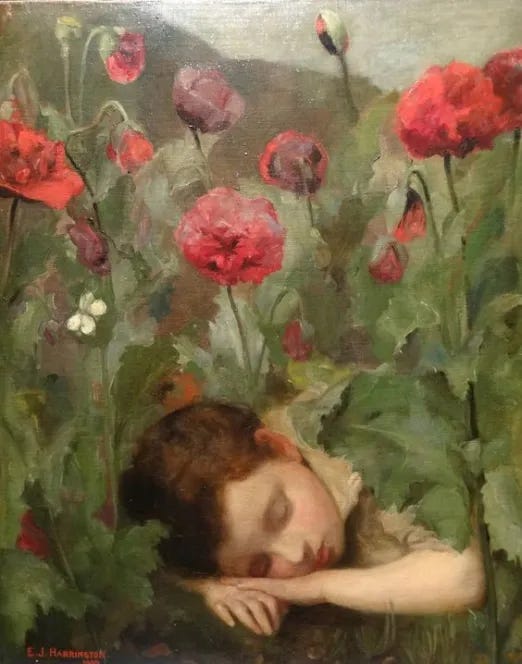The relevance of John Keats to contemporary readers has been a recurring topic in my writing; my book, John Keats: Poetry Life & Landscapes (Pen and Sword 2021) sought to highlight how he has influenced my life, and how he remains important today, woven as he is into the British landscape and the natural world around us. So, when I was sitting ruminating on my rather odd sleep patterns of late, who should I once again turn to? Naturally, Mr Keats.
‘Delicious drowsiness’ is a comment made by Andrew Motion in his fabulous biography, Keats, where he discusses a sonnet – To Sleep – written by the poet in April 1819 (a year in which his genius developed rapidly). It has always been a favourite of mine, as it was of my dear ‘Keats friend’ Ann Stone, with whom I discussed it regularly. The language is, I think, delicious. Read it aloud, or under your breath and feel the words in your mouth, and on your lips…
O soft embalmer of the still midnight,
Shutting, with careful fingers and benign,
Our gloom-pleas’d eyes, embower’d from the light,
Enshaded in forgetfulness divine:
O soothest Sleep! if so it please thee, close
In midst of this thine hymn my willing eyes,
Or wait the “Amen,” ere thy poppy throws
Around my bed its lulling charities.
Then save me, or the passed day will shine
Upon my pillow, breeding many woes,—
Save me from curious Conscience, that still lords
Its strength for darkness, burrowing like a mole;
Turn the key deftly in the oiled wards,
And seal the hushed Casket of my Soul.
Technically, Keats was working with, but not adhering strictly to, the Shakespearean sonnet form, and the language used is gentle and the vowels long, creating that ‘delicious drowsiness’ Motion refers to. One can debate the meaning, and whether it refers to death, as well as or instead of, sleep. The words "embalmed" and "casket," along with the closing of the eyes, certainly suggest finality, and the still recent death of his brother, Tom, was on Keats’s mind throughout that great year of poetry. This sonnet can also be seen as reminiscent of some of the lines in Keats’s Ode to a Nightingale, particularly the sixth stanza:
Darkling I listen; and, for many a time
I have been half in love with easeful Death,
Call’d him soft names in many a mused rhyme,
To take into the air my quiet breath;
Now more than ever seems it rich to die,
To cease upon the midnight with no pain,
While thou art pouring forth thy soul abroad
In such an ecstasy!
Still wouldst thou sing, and I have ears in vain—
To thy high requiem become a sod.
Melancholy, but accepting of death; longing for a painless end, drifting off to the sound of the nightingale. Such is the end he would have wanted for his brother, rather than the horrors of last-stage tuberculosis, which he had to endure himself just two years after the writing of this poem.
Since my early teenage years and discovery of Keats as ‘my’ poet, I have always considered this poem a hymn to sleep as relief from anxiety and worry. My lifelong struggles with anxiety continue, so I cling to lines such as ‘Then save me, or the passed day will shine/Upon my pillow, breeding many woes’ and ‘Save me from curious Conscience, that still lords its strength for darkness, burrowing like a mole’ as indicative of Keats’s ability to describe an eternal truth. How many of us have not experienced at least one night when sleep won’t come, and all the worries of our world come marching in, magnified and determined to disrupt our rest still further? We thump our pillow in frustration, toss and turn and long for something that will help us nod off – whether it be a book, hot drink or a sleeping tablet (that poppy with its ‘lulling charities’).
The beginning of the poem, rather than a reference to death, makes me think of that wonderful sleep of childhood, when a story is told, the light is turned out, and some magic makes our eyelids heavy and ensures any worries disappear. I have a vivid memory of my mum reading to me from The Wind in the Willows when I was aged 6 or 7. My ‘willing eyes’ had closed in sleep, but I was later awoken by some small noise, alerting me to my mum, arm stretched out over my candlewick bedspread, still holding the book and fast asleep.
Sleep is, of course, a time for healing. Physically, it is vital to our health and well-being. It can also offer us a brief respite from the concerns of everyday life. It can be a joyful feeling, shared in the arms of someone we love. Observing it in our children can be, outside that natural sense of relief at the peace we craved after a long day, a deeply moving experience, highlighting the innocence of the young, and their (hopefully) carefree existence. And at the end of life, we hope that in that final sleep, we will go gently into that ‘hush’d casket'.’
But in To Sleep, it is the last line that has always sent a shiver down my spine, of pleasure rather than fear. Turn the key deftly in the oiled wards/And seal the hushed Casket of my Soul, rival those other great lines in the second stanza of Nightingale…
O for a beaker full of the warm South,
Full of the true, the blushful Hippocrene,
With beaded bubbles winking at the brim,
And purple-stained mouth
and those in The Eve of St Agnes…
And still she slept an azure-lidded sleep,
In blanched linen, smooth, and lavender’d,
While he forth from the closet brought a heap
Of candied apple, quince, and plum, and gourd;
With jellies soother than the creamy curd,
And lucent syrops, tinct with cinnamon;
… for their sheer sensuousness, and the pleasure they offer the reader willing to speak them aloud (in private if you must!). Don’t you agree? Have you others to rival these?
There are several memorable descriptions of sleep, or the longing for it, in Keats’s poetry, and it is, I think, something we would all do well to turn to at times when our own conscience ‘burrows’, like that mole, under our mattresses and denies us that longed for unconsciousness.
I have found it difficult to write about Keats since the death of Ann Stone last August. She was a wise and well-read guide who, like me, responded to Keats on an emotional, over an academic, level. We could talk about how he made us feel, which is important when discussing any poetry. I am a believer in the maxim that there is a poet for everyone - if you think you don’t like poetry, you simply haven’t found your poet - and our difficulties with it are often ones of vocabulary. It isn’t always the poem that is hard to fathom, but often our inability to find words to express how it makes us feel. We then feel shy, or intimidated (especially if we are approaching it through an academic text), or we consider we must understand the work as a whole piece, rather than first responding to the sensations the words inspire.
If you are new to poetry (which I suspect very few writers on Substack are) do read one or two of the lines above and let me know how they make you feel. No complicated musings and interpretations, just feelings. I’d love to hear your comments!






Such a lovely piece. I didn't know this sonnet and know next to nothing about Keats, though I love to explore poems and poetry lately. More pieces like this would be very welcome. Thank you.
This is a lovely meditation on a favourite poem. Quite apart from the pleasures of that, I'm a big fan of what reading/writing/listening to/thinking about poetry can do for one's prose, fiction, storytelling. Thank you!